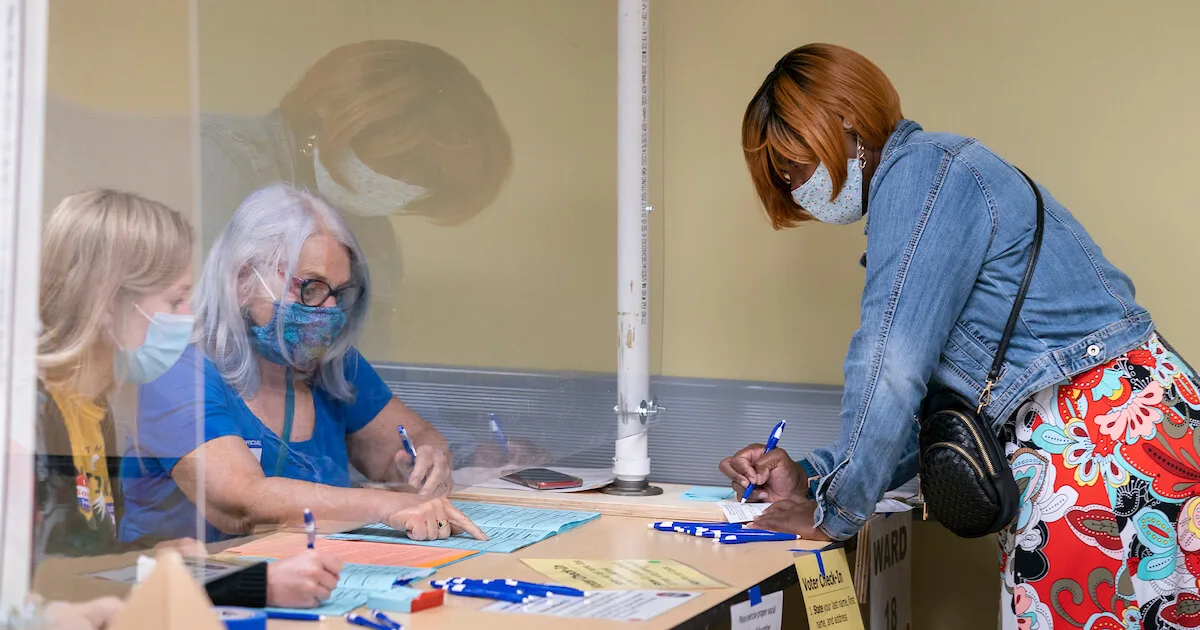
#image_title
#image_title
Those 16 years and older can earn money while working the Nov. 3 election.
For more coverage designed to help you cast a ballot this fall, see our special page on the election: Your Vote Matters
People looking for a way to serve their community and make a little extra cash in the process may want to consider working as an election poll worker for the Nov. 3 election.
“Wisconsin needs thousands of its citizens to step up and become poll workers for November,” said Meagan Wolfe, Wisconsin’s chief election official, in a statement. “We know there are Wisconsinites looking for ways to serve their communities through this difficult time. If you are a state, county, or municipal employee, or student or someone who is looking for temporary work, municipal clerks need you to make a difference.”
State municipalities usually need 30,000 poll workers for a November election, but this year the demand is greater because of a shortage related to the COVID-19 pandemic. Because significant numbers of existing poll workers are in their 60s, 70s, and 80s or have health conditions, clerks have experienced shortages during the April, May, and August elections, Wolfe said.
For this reason, workers who sign up for the November election will not be asked to make the typical two-year commitment to working on election days, Wolfe said.
The first steps to becoming a poll worker are found on My Vote WI’s website. Workers are usually assigned to their neighborhood voting site and their responsibilities rotate throughout the day.
To be a poll worker, a person must:
- Be 16 years of age or older.
- Be a qualified elector of the county in which the municipality is located (i.e., an adult citizen of the United States who has resided in the election district for 28 consecutive days and is not otherwise disqualified to vote).
- Be able to read and write fluently in the English language.
- Not be a candidate for any office to be voted on at the polling place at that election.
Poll workers are paid for their work, with rates varying based on each local government. Some municipalities also pay workers for attending the training sessions, which are required by state law. Workers can also choose to volunteer their service by writing off compensation.
“It’s a great resume builder and it looks great in civic engagement,” said Jim Verbick, Madison’s deputy city clerk. “We pay the same for everyone. We pay you the same even if you are 16.”
Worker duties include: issuing ballots to registered voters, registering voters, monitoring the voting equipment, explaining how to mark the ballot or use the voting equipment, or counting votes.
Other positions at a polling place include a greeter who assists with answering questions and directing voters to the voting area, an election registration official to register voters at polling sites, and tabulators to assist at the polling place after it closes.
Wisconsin law requires employers to grant an unpaid leave of absence to any employee who is appointed to service as an election official or poll worker. The employee must provide at least seven days’ notice to their employer. The leave is for the entire 24-hour period of each election day in which the employee serves in their official capacity as an election official. Upon request of any employer municipal clerks must verify appointments.
The guidelines are different for state employees who decide to work or volunteer as poll workers.
State employees must be granted leave without loss of pay or benefits for the entire 24-hour period of each election day in which the employee is serving as an election official. Employees must provide at least seven days’ notice of the need for leave.
State employees may certify to the municipality that they choose not to be paid as poll workers. Alternatively, those state employees who receive pay as election officials must certify in writing to the (state) payroll office the amount of compensation received. The agency must deduct that amount from the employee’s pay earned for scheduled work hours during the 24-hour period of the election day.
State employees who “volunteer” but are not appointed to be poll workers must take vacation or leave without pay if authorized by supervisory staff.
Politics

It’s official: Your boss has to give you time off to recover from childbirth or get an abortion
Originally published by The 19th In what could be a groundbreaking shift in American workplaces, most employees across the country will now have...

Trump says he’s pro-worker. His record says otherwise.
During his time on the campaign trail, Donald Trump has sought to refashion his record and image as being a pro-worker candidate—one that wants to...
Local News

Stop and smell these native Wisconsin flowers this Earth Day
Spring has sprung — and here in Wisconsin, the signs are everywhere! From warmer weather and longer days to birds returning to your backyard trees....

Your guide to the 2024 Blue Ox Music Festival in Eau Claire
Eau Claire and art go hand in hand. The city is home to a multitude of sculptures, murals, and music events — including several annual showcases,...


